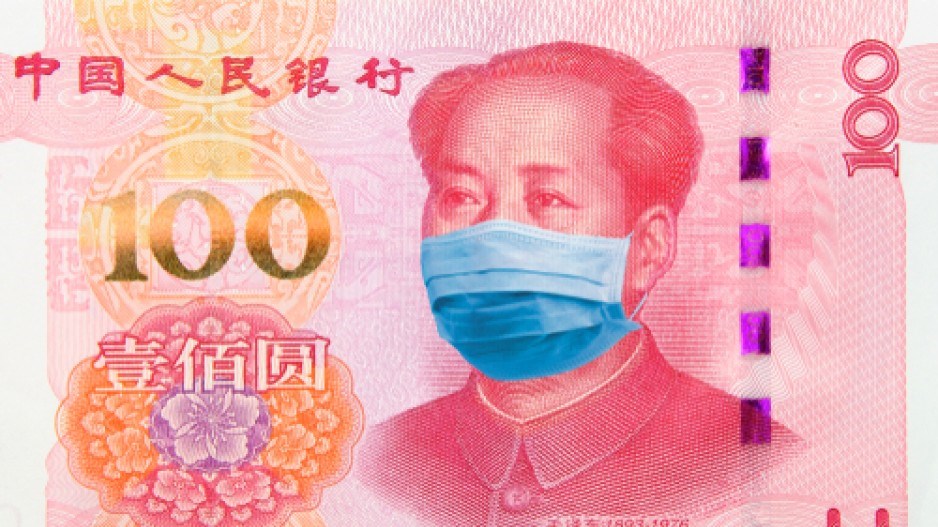The coronavirus COVID-19 outbreak that has killed more than 2,000 people is now much more than just a public-health crisis for China, where the virus originated.
The spread of the disease has become an unprecedented economic, social and political challenge for Beijing. Experts say that, depending on the length and scope of the outbreak, the crisis will likely lead to major, long-term changes to how the Chinese market operates, something that Canadian businesses looking at the world’s second-largest economy should follow closely.
Yves Tiberghien, director emeritus at the University of British Columbia’s Institute of Asian Research, said tracking of social media reaction to the coronavirus outbreak on Chinese platforms like Sina Weibo and Tencent’s WeChat showed that as many as 300 million users read or followed the hashtag mention of Li Wenliang, a doctor who died from the disease after his warning of the onset of the crisis was initially censored by local Chinese officials, in a single day after Li’s death.
“What happened was not chatter,” Tiberghien said. “It was a tsunami of social media reaction. It could be the biggest wave of its kind that has ever happened – it’s absolutely enormous…. There has been an explosion of commentary, some of them with a lot of emotion, but some also criticizing the lack of freedom on the internet. That’s new.”
Li’s death triggered that outpouring, Tiberghien said, because it touched on many public sore spots.
The story of the early whistleblower, who was reprimanded for offering health observations, and his young family left behind has highlighted anger toward local government. Many Chinese are under lockdown and cannot leave their homes. That gives them ample opportunity to browse social media and vent their frustrations, which amplifies the scope of the backlash.
“People are frustrated because they can’t go anywhere,” Tiberghien said. “There has never been, in modern times, a time when everybody missed Chinese New Year. There was a complete losing-out of the festivities and essentially a wiping-out of the biggest celebratory holiday of the year. People can’t celebrate with each other; everybody’s scared. It’s huge – and all these people are reading social media, asking, ‘Who did this to us?’ And that leads back to Wuhan authorities.”
Beijing appears to have already responded to the outcry. It removed the Communist Party chiefs in Wuhan city and Hubei province last week, which has helped focus anger on local authorities and not the central government.
Tiberghien said Beijing will do everything in its power to ensure the outbreak is contained, because officials know the stakes involved.
Monika Wu, president of the China Hubei Association of Vancouver, said community members understand the difficult situation and support Beijing’s drastic measures to contain the crisis, including the lockdown of Wuhan and Hubei. But Wu added that, judging from electronic and phone contact with family and friends in the centre of the outbreak, the mood of frustration tracked by Tiberghien is a reality.
What changes the outbreak will cause in China remains unclear, however. Tiberghien said much depends on whether COVID-19 continues to spread, but as of now, the most likely change will be a renewed policy focus on public health.
Tiberghien noted China’s business model is often completely policy driven, with government agencies and businesses quickly falling in line once Beijing has decreed a new directive.
China’s coronavirus outbreak will spur the same rapid adjustments to policy and business, he said.
“In the past, it was all about growth, the one-child policy and social control. Then, the green topics surrounding environmentalism started to come up; if you have pollution in your jurisdiction, or if you didn’t do much on climate change, then you could be punished. Now, the public-health side of that will go up a lot for officials.”
But he added that another potential change could be improvements to transparency at lower levels of government, because the outbreak has shown that the current system discourages whistleblowers.
In Li’s case, “local government officials were fearful of spreading bad news,” Tiberghien said. “So how do you address that? That is a deeper issue. How do you make people less fearful to be the whistleblower? Should local governments have full transparency to fully announce these types of news without fear?”
One aspect of Chinese policy/industry that will have to change is its food safety regulations regime, said Vancouver-based food industry personality Matthew Murtagh-Wu, whose Dumpling King made-to-order food delivery business has heavy ties to Vancouver’s Chinese community food producers. Murtagh-Wu noted that news that the virus might have originated in bats and could have been consumed by restaurant patrons in Wuhan means that Beijing will likely take a harder line on food regulations to prevent other outbreaks from taking place.
“I think the mainland Chinese government will have to look at the way produce is distributed and managed within its borders,” he said.




